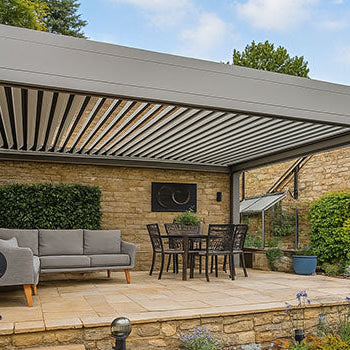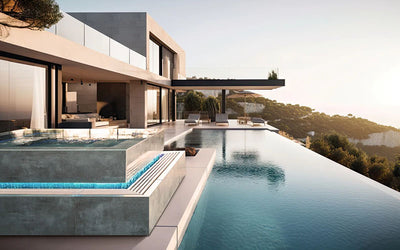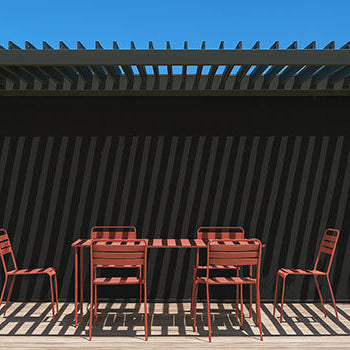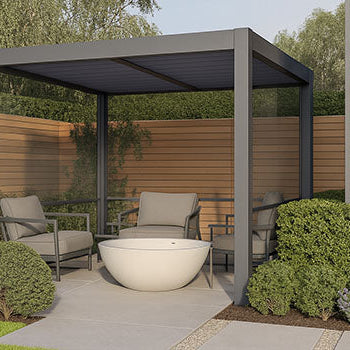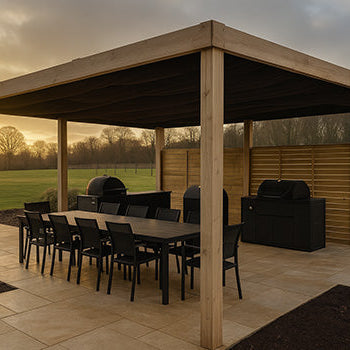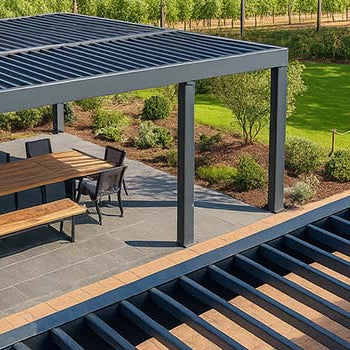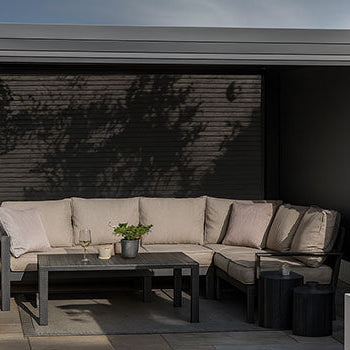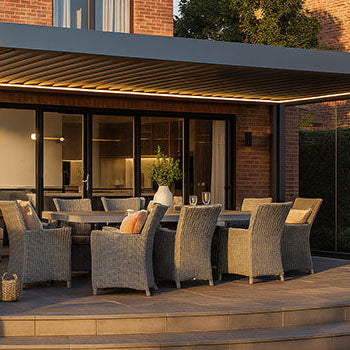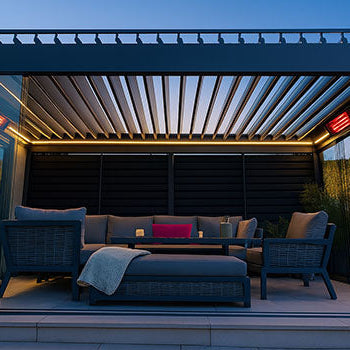Pergolas aren’t just pretty garden hats, they’re built from wood, metal, or even modern composites, each with their own charm. Short answer: Pergolas are made of timber, aluminium, steel, vinyl, or composite materials. Want one that lasts through British rain or just looks stunning on Instagram? Keep reading to find your perfect pergola match.

An Introduction to Pergola Materials
Pergolas are the crown jewels of the garden, equal parts stylish and functional. But before you start dreaming of trailing wisteria and outdoor sofas, you need to ask: what are pergolas made out of? The answer? A mix of materials, each with their own perks and quirks.
How Material Choice Affects Durability, Cost, and Style
Picking the right pergola material is like choosing the right jacket for the weather. You want it to look good, hold up through the seasons, and not empty your wallet.
Timber offers a natural charm, while metal gives you a sleek, modern edge. Vinyl and composite? Think low-maintenance convenience. Your choice will influence how long your pergola lasts, how much work it needs, and whether it turns heads or blends in.
Key Factors to Consider: UK Climate, Budget, and Maintenance
We all know British weather is... unpredictable at best. One minute it's sunny, the next it's pouring. So, your pergola needs to cope with damp, wind, and the odd frost.
Budget matters too. Timber can be affordable upfront but pricier long term with maintenance. Meanwhile, metal and vinyl options cost more to start but need less upkeep over the years.
If you're not into yearly re-staining, lean toward materials that practically take care of themselves.
Traditional Charm: Wooden Pergolas
Wooden pergolas are like a classic tweed jacket, timeless, warm, and full of character. They suit almost any garden and offer endless personalisation.
From rustic to refined, wood brings a natural touch no other material can match.
Pressure-Treated Softwoods (Pine, Cedar)
Softwoods like pine and cedar are budget-friendly favourites. They're often pressure-treated to resist rot and insects, making them more garden-friendly.
Cedar stands out for its lovely scent and natural resistance to pests. Pine? Cheaper, but it needs a bit more TLC.
If you're working with a modest budget and don't mind some maintenance, these are solid choices.
Durable Hardwoods (Oak, Iroko)
Hardwoods are your heavyweights. Oak and iroko bring strength, durability, and rich colour to the table.
Oak has that quintessential English countryside feel, while iroko gives a more tropical, luxury vibe. These woods age beautifully but come at a higher price point.
If you want a pergola that stands proud for decades, hardwood is worth the splurge.
Pros and Cons of Using Wood
Pros:
Cons:
-
Needs regular upkeep (sealing, staining)
-
Can warp or rot if neglected
-
Vulnerable to pests and moisture over time
Modern and Low-Maintenance: Metal Pergolas
Metal pergolas are like the modern loft apartment of outdoor structures, sleek, functional, and built to last. They’re ideal for busy homeowners who don’t want the faff of annual treatments or worry about rot.
Aluminium: Lightweight, Rust-Proof, and Contemporary
Aluminium is the go-to for modern pergolas in the UK. It’s rust-proof, lightweight, and available in stylish powder-coated finishes.
Great for smaller gardens or rooftop terraces where weight matters, aluminium needs almost zero maintenance. Just give it a quick wipe now and then, and you're good.
Plus, it holds its colour well and doesn't crack or peel like paint can.
Steel: For Maximum Strength and Industrial Style
Steel is the tough guy. Heavier and stronger than aluminium, it’s ideal for larger structures or wind-prone areas.
It brings a bold, industrial aesthetic that suits modern landscaping. Just keep in mind, steel needs protective coatings to fend off rust.
Without it, that sleek grey could turn to orange in no time.
Pros and Cons of Using Metal
Pros:
Cons:

The Practical Choice: Vinyl and Composite Pergolas
Not a fan of maintenance? Vinyl and composite pergolas might be your dream come true. They combine durability with minimal effort, perfect for homeowners who want to enjoy their garden, not babysit it.
Vinyl (uPVC): The Low-Maintenance Option
Vinyl (or uPVC) pergolas are practically zero-fuss. They won’t rot, peel, or warp, and you can clean them with a hose.
They usually come in clean, white finishes that suit modern homes. On the flip side, they can look a bit too polished or plastic for some tastes.
Not great for painting either, so pick a style you’ll still love in ten years.
Composite Materials: The Best of Wood and Plastic
Composite pergolas blend the best parts of wood and plastic. Think natural texture with extra strength and weather resistance.
They don’t need painting or staining and often include recycled materials. Great news for the eco-conscious gardener.
These pergolas are sturdy, stylish, and super low-effort.
Pros and Cons of Using Vinyl and Composites
Pros:
Cons:
Comparing the Most Popular Pergola Materials
So, which pergola material actually suits your garden goals? Let’s break it down and compare where it counts.
A Head-to-Head Look at Lifespan
| Material |
Average Lifespan |
| Cedar |
15 – 20 years |
| Oak / Iroko |
25 – 30+ years |
| Aluminium |
20 – 30 years |
| Steel |
15 – 25 years (if properly coated)
|
| Vinyl / Composite |
20 – 30 years |
Hardwoods and composites win on long-term durability, but aluminium isn’t far behind.
Maintenance Requirements for Each Material
| Material |
Maintenance Level |
| Pine |
High – Requires regular sealing and is prone to rot without treatment. |
| Cedar |
Moderate – Naturally resistant to decay but benefits from occasional staining. |
| Aluminium |
Low – Minimal upkeep; doesn't rust and easy to clean. |
| Steel |
Moderate to High – Strong but prone to rust if not properly coated. |
| Vinyl / Composite |
Very Low – Highly durable and virtually maintenance-free. |
If you're a hands-off gardener, vinyl or aluminium are your low-maintenance heroes.
Comparing the Average Cost in the UK
| Material |
Average Cost Range (per m²) |
| Pressure-Treated Pine |
£30 – £60 |
| Cedar |
£50 – £100 |
| Oak / Iroko |
£80 – £150 |
| Aluminium |
£100 – £200 |
| Vinyl / Composite |
£120 – £250 |
Softwoods like pine are easiest on your wallet upfront, but composite and hardwoods offer better value long-term.

Frequently Asked Questions About Pergola Materials
What is the most durable material for a pergola?
Hardwoods like oak and composite materials last the longest. Aluminium is also incredibly durable, especially in wet climates.
What is the most eco-friendly pergola material?
Timber from FSC-certified sources is your best bet for sustainability. Composite materials made from recycled plastic and wood fibres are also planet-friendly.
Can you paint or stain different pergola materials?
Wood is the most customisable. You can paint, stain, or leave it natural. Metal pergolas come pre-finished but can be powder-coated. Vinyl and composite pergolas? Best left as-is, since paint won’t stick well.
The bottom line? Choosing the right pergola material means balancing beauty, weather-resistance, and effort. Whether you go classic with timber, modern with metal, or fuss-free with composite, your perfect pergola is just a decision away.
